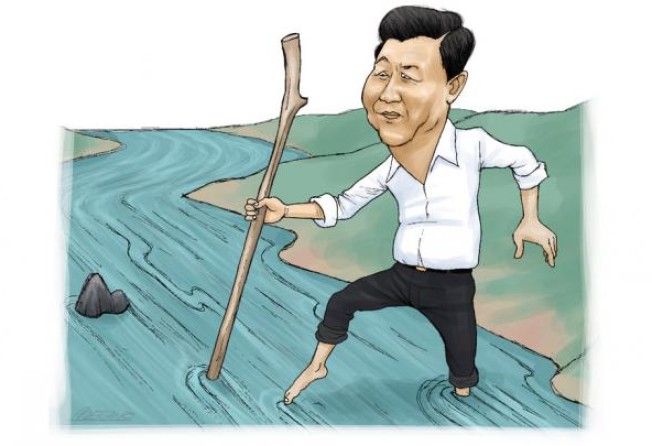Xi gives reform advocates cause for hope
Gary Sands says events during Xi Jinping's southern tour, in Deng's footsteps, augur well for change in China despite the failure of key reformers to make it to the top leadership body

The once-in-a-decade leadership transition in China last month left some analysts fearing for the cause of reform after key reformers Li Yuanchao, Wang Yang and Liu Yandong failed to reach the Politburo Standing Committee, China's highest leadership body.
Yet this week, Xi Jinping , who succeeded Hu Jintao as Communist Party general secretary, seemed to hold out promise for reform. In his first trip since taking over, Xi spent five days in Guangdong province, drawing parallels to the "southern tour" by paramount leader Deng Xiaoping 20 years ago that ushered in widespread economic reform. Deng engineered China's economic rise after the death of Mao Zedong in 1976, through championing the idea of "crossing the river by feeling the stones", or testing reform locally and, if successful, adopting it more broadly.
Xi's first stop, Shenzhen, proved a timely reminder of the need for urgent reform, as 3,000 workers at a local printing factory gathered to strike for more than eight hours.
While Shenzhen police were busy reporting that no roads had been blocked off for the sake of Xi's motorcade, the strikers blocked a section of an expressway, causing an extensive traffic jam. Crowds were reportedly dispersed by a large number of armed police, and several strikers were taken away and beaten.
Xi's trip was unhindered, however, and he visited a statue of Deng built to commemorate the late leader's visit. Xi's father, Xi Zhongxun , was a revered senior official hand-picked by Deng to help implement reform as Guangdong's governor in the late 1970s and early 1980s. Xi was shown on local television telling his entourage, which included retired officials who had accompanied Deng on his trip, that China must deepen reforms to perfect its market economy.
Xi met local officials, who raised issues about tax, financial and land policies. Xi's comments to "resolve the issues by strengthening the rule of law" may have resonated not only at the nearby printing factory but also with Wang, Guangdong's reform-minded party boss and a member of Xi's entourage.
Wang was thought to be out of favour after he missed out on a seat on the Politburo Standing Committee. He had eased restrictions on non-governmental organisations and won international plaudits for negotiating a non-violent settlement in Wukan , where residents took over the village following a land grab by local officials. Wang was elected to the less powerful Central Committee, along with Liu.
Xi's southern tour also coincided with an apparent easing of internet search restrictions, as Sina Weibo, China's largest microblog service, unblocked searches for the names of many top political leaders. Searches for Xi, Vice-Premier Li Keqiang and other leaders - which have long been barred under strict censorship rules - revealed detailed lists of news reports as well as user comments. However, searches for Premier Wen Jiabao , whose family members are accused of accumulating massive fortunes during his tenure, are still blocked.
The easing of internet search restrictions may have been to defuse anger over the news that Xinhua has been posting on Twitter since March, when the site is blocked to most people. National newspapers The Global Times and China Daily also have Twitter accounts. Further censorship efforts may be futile. Mainland internet users are increasingly turning to virtual private networks to access blocked information and the party is losing the battle to block or slow popular VPNs as new, faster ones take their place.
However, a meeting that would have been most encouraging to reformists ultimately did not take place. It had been rumoured that Xi would meet Li Zhengtian , a professor at the Guangzhou Academy of Fine Arts. Li, a philosopher and dissident during the Cultural Revolution, was imprisoned for calling for democracy and the rule of law, though he was subsequently rehabilitated by Xi's father. Perhaps Xi realised this stone was just too slippery.
Nonetheless, with the highly symbolic visit to Deng's statue, the encouraging speeches on reform and the unblocking of some internet searches, there is hope for significant reform under Xi's leadership, even if it comes at a slow and measured pace.
Xi is fully aware of the challenges the party faces. He was quoted as saying that "we should recognise that adverse domestic and overseas effects will be long term, complicated and winding", and he seems willing to undertake reform to renew China as an economic force.
More striking, however, is his display of confident maturity in dealing with these effects. "We should not avoid conflicts or cover up problems," he said.
Xi understands that the Chinese public is sick and tired of corruption and cover-ups, and he may also be aware that it is becoming increasingly difficult for the party to hide information by censoring internet searches.
Xi's southern tour has again given reformists hope for the future, but while talk is cheap, action by a stability-obsessed party leadership is dangerous. The new party leadership realises it needs to cross the river, even though the currents are now swifter. Unless decisive action is taken to implement stalled reforms, the party risks continued economic malaise and growing social unrest that could threaten its grip on power.
Gary Sands has run his own private equity financial advisory in Shanghai since 2006